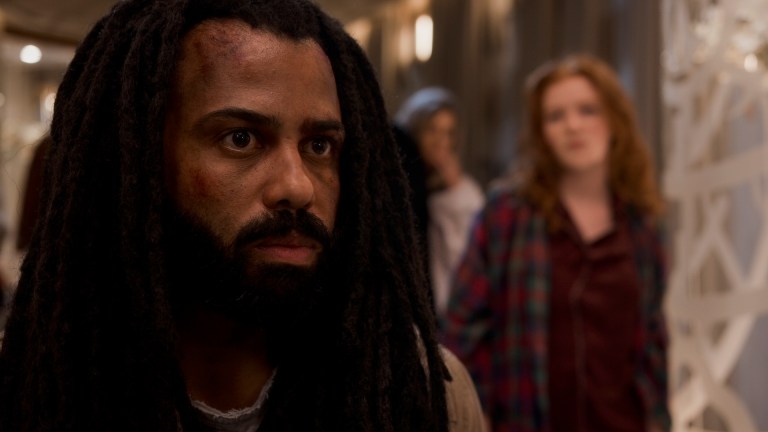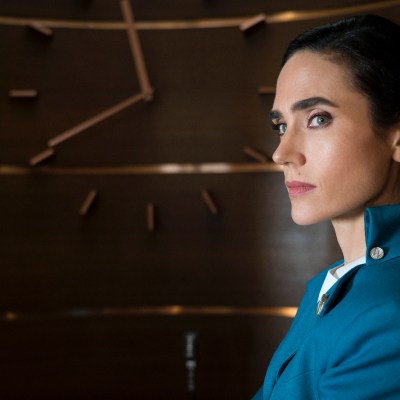Snowpiercer Episode 4 Review: Without Their Maker
Dangerous secrets are potentially revealed and cross-class romances are explored on a surprising Snowpiercer.

This Snowpiercer review contains spoilers.
Snowpiercer Episode 4
Is anyone really surprised that there are two different sets of rules in the world of Snowpiercer? The rich, as we’ve seen, get to live out their days in luxury, enjoying Jinju’s delicious food and not worrying all that much about disruptions in Third Class and another revolt in the tail. That’s just easily dismissed train talk, the “train talk” being the gossip network that thrives in any ecosystem. All of the violence and rough business happens far down the train; the only thing the true elites like Lilah Folger (Kerry O’Malley) and company have to worry about is a besmirched reputation. And if they do have any issues, well… they have their armed security guards around to take care of that sort of thing.
That reveal is a shock to Layton (Daveed Diggs), who as a former cop would be one of the ones most expected to be able to keep his sidearm when boarding Snowpiercer, but in true totalitarian fashion, everyone was disarmed for their own safety except for those who make the rules. Even as the train detective, he doesn’t get so much as a club, let alone a revolver like that carried by Eric (Matt Murray), last seen killing Nikki (Madeline Arthur) and at least two other people in the recovery car near the Drawers. She knew the secret, a secret that Eric was willing to kill to protect, and like Layton discovers later in the episode, secrets uncovered can be dangerous for the person clever enough to suss them out or unlucky enough to witness malfeasance.
The words of those in charge, particularly Melanie, are easy to reproduce. They want the killer caught and the right person punished. But, as Jinju points out in the cold opening, Snowpiercer isn’t just a train, it’s a system, and systems resist change, particularly when there are elements that actively resist any change that might make things uncomfortable. Some believe that rights for all reduce their rights, both in fictional worlds and in the real world. Snowpiercer, for all its delays and production issues, is arriving at exactly the right time for its narrative to really hit home for anyone who might be sitting at home and watching it, rather than marching in protests or partaking in the slow reopening of the world economy in the wake of COVID-19 restrictions.
At every point, Layton struggles against a system designed to keep people like him subservient. The tailies do the dirty work that keeps Snowpiercer working, like mucking out sewage lines as shown by Josie’s trip into the tunnels that run under the train. It’s work even third class passengers won’t do, and they make up the bulk of the train’s manual labor, from janitorial services to working as brakemen and security forces. In exchange, they’re treated like mushrooms, with no light and only something like slimy nutraloaf to keep them barely fed enough to be functional. Even when Layton is successful at figuring out just who’s been killing and castrating unlucky thirdies, his reward isn’t that third-class berth and that job as train detective, but something far worse than the jail cell that the real castrator is sent to. (Even the first class jail cells are nice.)
That class difference is one of the major focal points of Hiram Martinez’s script. First class live in their own world, literally, and only journey down to second or third class in a sort of poverty tourism, a trip to the relatively safe seedier side for illicit thrills and bowls of cheap noodles. Sure, their presence keeps the official economy moving—first class drink tokens left by Eric in the third class car are apparently a big deal—but it’s something like a trip to the zoo for people like LJ. They get to see the poor, even interact with the poor, but they’re never in any real danger. In fact, the poor are the ones in danger from the whims of the first class judging by the nature of the killer’s status on the train, and the difficulty anyone would have bringing a first class murderer to justice on a train designed to cater to their every whim, no matter what that might be.
Only Melanie, it seems, and Wilford, have the authority to even get first class out of bed before breakfast, and the scene in which Melanie and Layton play good cop/bad cop (or Wilford and tailie) is very well written by Martinez, and a great bit of performance from both Jennifer Connelly, who is allowed to show a little bit of strain at the edges of Melanie’s cool perfection, and Daveed Diggs, who leans into his license to be a stereotype by being as boorish a tailie as possible, right down to digging into the breakfast buffet with his bare hand in front of horrified wealthy people. It’s played up, to play on the worst fears of first class, and it’s a lot of fun as it leads into his interactions with LJ (Annalise Basso), who is both interested in and also kind of sees through Layton’s act, but won’t let on that she knows because she needs something from him.
The scene is deftly handled by director Frederick E.O. Toye, who has excelled at both detective stories and science fiction in his career. Layton knows he’s simply using stereotypes to his advantage, and clever enough to know when LJ is trying to do the same thing to him. Melanie knows he’s acting out on her orders, and that Layton is more dangerous to the myth of Mr. Wilton than any potential phone call from Lilah ever could be. Lilah, when pushed, will back down because angering Wilton would be worse for her place in the social stratus than the offense of allowing a tailie and one of the help to look through her apartments for clues.
No doubt that Lilah will try to cover her secrets up with the same ruthless efficiency that Melanie covers up her own secrets by taking Layton out of the equation. The comedy of manners elements relaxes viewers a little, so that when the betrayal happens, it lands harder. There’s a huge difference between a romance between a second and third (or even a first indulging her whims with the hired help) and letting a tailie know Snowpiercer’s biggest secret.
There’s losing face and losing control of the entire system. Even if the system runs without Wilton actually being there, the myth of Wilton is crucial to maintaining control. Something has to keep both spoiled rich and desperate poor in line, after all; maybe the threat of Wilton’s displeasure and social pressure might work better than the threat of total extinction for the wealthiest classes?


